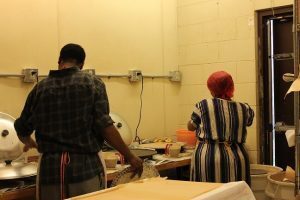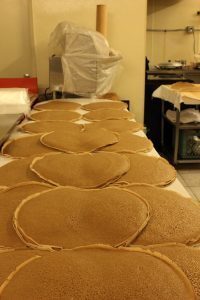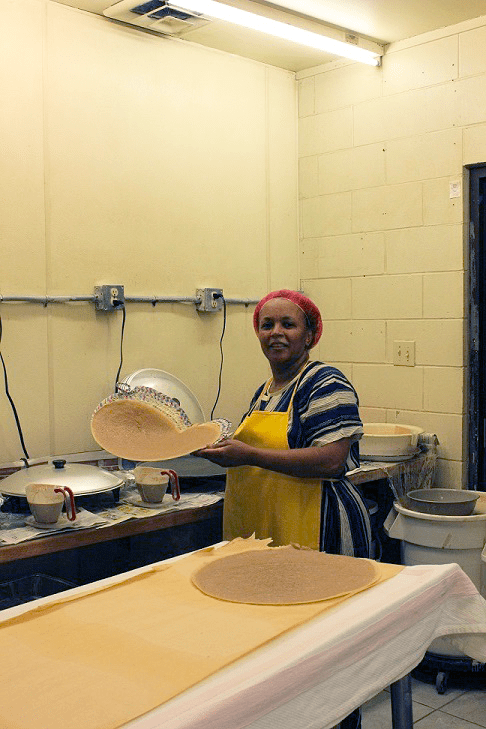When the 7-11 at the corner of Spence and Sargent became Quick Convenience, you may have noticed that store is only half as big as it used to be. Well, on the side you never see there is a busy injera bakery producing hundreds of the unique Ethiopian flatbread every day! Self-proclaimed “injera-ologists” Ayni and Ali Saeed are the brains behind the operation. Together, this Ethiopian couple has dedicated the last 27 years to developing the perfect recipe and making Winnipeg’s best (and only) injera.

What is injera, you ask? Injera is the national bread of Ethiopia, characterized by its flat round shape and sour taste. Injera is sometimes referred to as an edible tablecloth because it often ends up keeping your plate clean! Often served underneath stews, curries, lentils, and other traditional dishes, injera acts like a sponge, absorbing liquids, sauces, and broths, preventing them from ever actually touching your plate.


According to Ali, “you need the right temperature and lots of bubbles. If there are no bubbles, your injera is no good!”
The process of making injera resembles making crepes or pancakes. The injera batter is ladled onto a hot griddle and removed once it turns a beautiful golden brown colour. It is then left to cool. However, unlike crepes, injera is made from an ancient grain called teff. Unique to Ethiopia, teff does not grow well outside the country and must be shipped from Ethiopia. The rest of the ingredients required to make injera (oil, water, whole grains, etc.) can be purchased here in Winnipeg… but the skill to make it cannot! According to Ali, making injera is no walk in the park, “you need to know how — you need the right temperature and lots of bubbles. If there are no bubbles, your injera is no good!”
Supplying injera for eleven local restaurants, their individual customers, and three Ethiopian businesses of their own, the couple needs to make a hefty 725 injera a day to meet demand. While it’s clear that the Saeed’s injera must be better than good, good wasn’t always a reality for the Saeeds, who were once Ethiopian refugees (and now proud Canadian citizens).
Ali was born in Ethiopia in 1955. Throughout his youth, he spent much of his time writing, advocating, and speaking out against social injustice. During the Red Terror, a dark period of Ethiopia’s history when anyone who didn’t conform to the policies of dictator Mengistu Haile Mariam was punished, Ali, who advocated women’s rights and social justice, was imprisoned for five years.
Ali was later freed and fled to Somalia, only to be imprisoned once again. In total, Ali spent over seven years imprisoned in extremely harsh conditions. In 1984, he was finally freed after Amnesty International, the United Nations High Commissioner for Refugee Agency and the Canadian Government collaborated to get Ali refugee status in Canada.
Since arriving in Canada in 1984, Ali and Ayni have built their Canadian dream from the ground up. They have established a family, opened their injera business (on an initial loan of $3000.00), and sponsored over 100 refugees to come to Canada. In addition, they’ve founded the Ethiopian Society of Winnipeg, and continue to advocate for human rights in Canada and abroad. Rather than flaunting their great contributions to both West End and global communities, Ali says that “it’s a privilege [to help the community]. We have great respect for our community”; a poignant piece of advice which we should all live by. To hear more of Ali’s story, please watch the TEDX Talk: The Barefoot Man is Coming on YouTube, or visit the Canadian Museum of Human Rights where there is a featured exhibit on Ali.

Ali Saeed

Ayni Saeed
Ali and Ayni make the only injera in Winnipeg, so if you order any at an Ethiopian restaurant in Winnipeg it will have come from right here.
You can have an opportunity to learn all about the making of injera and meet Ali and Ayni by taking a West End Artisan Tour taking place this summer in the West End.
